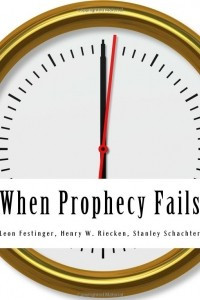Описание книги
When Prophecy Fails: A Social and Psychological Study of a Modern Group That Predicted the Destruction of the World is a classic work of social psychology by Leon Festinger, Henry Riecken, and Stanley Schachter which studied a small UFO religion in Chicago called the Seekers that believed in an imminent apocalypse and its coping mechanisms after the event did not occur. Festinger's theory of cognitive dissonance can account for the psychological consequences of disconfirmed expectations. One of ...
When Prophecy Fails: A Social and Psychological Study of a Modern Group That Predicted the Destruction of the World is a classic work of social psychology by Leon Festinger, Henry Riecken, and Stanley Schachter which studied a small UFO religion in Chicago called the Seekers that believed in an imminent apocalypse and its coping mechanisms after the event did not occur. Festinger's theory of cognitive dissonance can account for the psychological consequences of disconfirmed expectations. One of the first published cases of dissonance was reported in this book. Festinger and his associates read a story in their local newspaper headlined "Prophecy from planet Clarion call to city: flee that flood." The prophecy came from Dorothy Martin (1900–1992), a Chicago housewife who experimented with automatic writing. (In order to protect her privacy, the study gave her the alias of "Marian Keech" and relocated her group to Michigan.) She had previously been involved with L. Ron Hubbard's Dianetics movement, and she incorporated ideas from what later became Scientology. The group of believers, headed by Keech, had taken strong actions to indicate their degree of commitment to the belief. They had left jobs, college, and spouses, and had given away money and possessions to prepare for their departure on a flying saucer which was to rescue the group of true believers. She claimed to have received a message from a fictional planet named Clarion. These messages revealed that the world would end in a great flood before dawn on December 21, 1954. After the failure of the prediction, she left Chicago after being threatened with arrest and involuntary commitment. She later founded the Association of Sananda and Sanat Kumara. Under the name Sister Thedra, she continued to practice channeling and to participate in contactee groups until her death in 1992. The Association is active to this day. Festinger and his colleagues saw this as a case that would lead to the arousal of dissonance when the prophecy failed. Altering the belief would be difficult, as Keech and her group were committed at considerable expense to maintain it. Another option would be to enlist social support for their belief. As Festinger wrote, "If more and more people can be persuaded that the system of belief is correct, then clearly it must after all be correct." In this case, if Keech could add consonant elements by converting others to the basic premise, then the magnitude of her dissonance following disconfirmation would be reduced. Festinger and his colleagues predicted that the inevitable disconfirmation would be followed by an enthusiastic effort at proselytizing to seek social support and lessen the pain of disconfirmation. Festinger stated that five conditions must be present if someone is to become a more fervent believer after a failure or disconfirmation: A belief must be held with deep conviction and it must have some relevance to action, that is, to what the believer does or how he or she behaves. The person holding the belief must have committed himself to it; that is, for the sake of his belief, he must have taken some important action that is difficult to undo. In general, the more important such actions are, and the more difficult they are to undo, the greater is the individual's commitment to the belief. The belief must be sufficiently specific and sufficiently concerned with the real world so that events may unequivocally refute the belief. Such undeniable disconfirmatory evidence must occur and must be recognized by the individual holding the belief. The individual believer must have social support. It is unlikely that one isolated believer could withstand the kind of disconfirming evidence that has been specified. If, however, the believer is a member of a group of convinced persons who can support one another, the belief may be maintained and the believers may attempt to proselytize or persuade nonmembers that the belief is correct. Книга «When Prophecy Fails» авторов Henry W. Riecken, Leon Festinger, Stanley Schachter оценена посетителями КнигоГид, и её читательский рейтинг составил 0.00 из 10.
Для бесплатного просмотра предоставляются: аннотация, публикация, отзывы, а также файлы для скачивания.
- Просмотров: 166
- Рецензий: 0
- Переводчики: не указаны
- Серия: не указана
- ISBN (EAN): 978-1536980301
- Языки: Английский
- Возрастное ограничение: не указано
- Год написания: 2016






Рецензии на книгу
Написано 0 рецензий